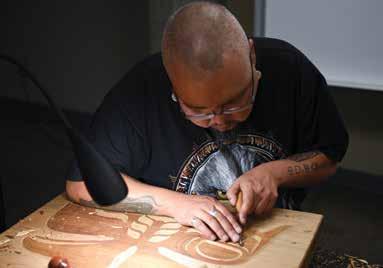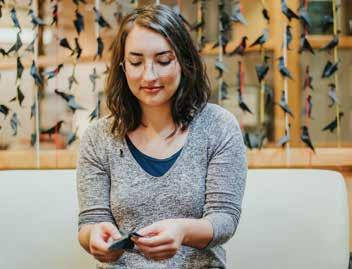
7 minute read
Emotional Intelligence Connected to Academic Success
According to an article recently published in the Psychological Bulletin Journal, research shows that students who are able to understand and manage their emotions effectively (i.e., who have a high emotional intelligence) do better in school than their less skilled peers. “It’s not enough to be smart and hardworking,” explained Dr. Carolyn MacCann, PhD, of the University of Sydney and lead author of the study. “Students must also be able to understand and manage their emotions to succeed at school.” By analyzing data from more than 160 studies published over two decades, representing more than 42,000 students from 27 countries, MacCann and her colleagues found that students with higher emotional intelligence tend to get higher grades and better achievement test scores than those with lower emotional intelligence scores. This finding held true even when controlling for intelligence and personality factors, and regardless of age. As for why emotional intelligence can affect academic performance, MacCann believes a number of factors may come into play. “Students with higher emotional intelligence may be better able to manage negative emotions, such as anxiety, boredom and disappointment, that can negatively affect academic performance,” she explained. “Also, these students may be better able to manage the social world around them, forming better relationships with teachers, peers and family, all of which are important to academic success.” To help nurture and grow emotional intelligence in students of all ages, MacCann recommends starting early and engaging the entire school through teacher-led programs, thus, increasing skills for everyone. “Programs that integrate emotional skill development into the existing curriculum would be beneficial,” she said. This article is based on the research article “Emotional Intelligence Predicts Academic Performance: A Meta-Analysis,” by Carolyn MacCann, PhD, Yixin Jiang, PhD, Luke Brown, MSc, and Micaela Bucich, BPsych. The complete article is available at https://www.apa.org/pubs/journals/ releases/bul-bul0000219.pdf Emotional Intelligence Connected to Academic Success Students with higher emotional intelligence tend to get higher grades and better achievement test scores.
UNBC’s Story ‘En Cha Hunà reflects the heart and soul of the University of Northern British Columbia (UNBC). The school motto, from the Dakelh (Carrier) language, directly translates as “that person also lives” and is interpreted as “respecting all forms of life”—a reminder of the spirit of academic freedom, respect for others and willingness to recognize different perspectives.
Advertisement
A university both in and for the North, UNBC is located in picturesque Northern British Columbia (BC), Canada, with campuses located in Prince George, Terrace, Quesnel, Fort St. John, and in Gitwinksihlkw, where partner institute Wilp Wilxo’oskwhl Nisga’a is located. The institute is a community-driven, student-focused aboriginal post-secondary institution dedicated to providing top quality, culturally appropriate education to everyone who lives in the Nass River Valley area.
UNBC is ranked #2 overall by Maclean’s magazine as one of the best small universities in Canada for 2020 and is the top university in the Indigenous visibility category.
The university is dedicated to its students and to building bridges with new partners, taking measurable steps towards reconciliation and brighter futures.
Opening Doors for Indigenous Learners

The University of Northern British Columbia (UNBC) is taking the words of the Chair of the Truth and Reconciliation Commission of Canada to heart by collaborating with the Lheidli T’enneh First Nation to ensure Lheidli T’enneh members can attend UNBC at no cost to the student. “This new agreement with UNBC is a specific example of what reconciliation looks like,” said Lheidli T’enneh Chief Clay Pountney. “It describes a new partnership that requires investments from both parties to benefit Lheidli students. I’m not aware of a similar partnership anywhere in Canada.” UNBC’s largest campus in Prince George is located on Lheidli T’enneh territory in British Columbia’s central interior. For years, the university and the Lheidli T’enneh have been forging ever-deepening ties, working towards meaningful reconciliation. This agreement moves that partnership another big step further by eliminating financial barriers and increasing access for Lheidli T’enneh members. “The Truth and Reconciliation Commis- sion made it very clear that Canada, as a nation, simply must do better with regards to making education accessible for Aboriginal Peoples,” said UNBC President Dr. Daniel Weeks. “This is leadership in an area in which our country needs it and is another Northern BC initiative that has the potential to have national impact.” According to the Truth and Reconciliation Commission, financial issues are one of the major obstacles that prospective Indigenous students face, resulting in fewer students accessing post-secondary education. Consequently, Canada is missing out on the next generation of Indigenous educators, social workers and other professionals. “This is a win-win for both ourselves and UNBC,” explained Pountney. “It also addresses a common misunderstanding in Canada that all Indigenous People have unlimited access to post-secondary education, which simply isn’t the case.” The agreement, announced in October 2019, creates two programs. The first, called the Lheidli T’enneh Northern Promise Partnership Program, provides candidates who meet UNBC admission requirements with the funding they need to achieve an undergraduate degree at UNBC. The university will provide full tu- ition support for a full undergraduate de- gree, and the Lheidli T’enneh Nation will “Education is the key to reconciliation,” said Senator Murray Sinclair.
cover funding to support student needs, such as living expenses (including housing, food and transportation), fees (other than tuition), textbooks and tutoring. UNBC Art Brings Meaning to Reconciliation Cree/Dakelh artist Clayton Gauthier believes art is a gift from the Creator. Ravens for Reconciliation The 1,000 Ravens campaign is one of many examples of how UNBC is using art as a means to work towards reconciliation. Nenachalhuya – The Cedar Plank Project Ravens for Reconciliation


The second program, called the Lheidli T’enneh Northern Promise Partnership Transition Program, is available to Lheidli T’enneh identified students who do not meet the normal admission requirements for UNBC entrance yet demonstrate strong academic promise and wish to transition from high school or college to university. UNBC will provide full tuition support and the Lheidli T’enneh Nation will cover funding to support student needs. “Our partnership with UNBC creates new post-secondary opportunities for our students and will help our Nation move forward,” said Pountney. “As Indigenous People, we travelled by art,” said Gauthier. “The rock paintings and the rock carvings, we travelled by those, so they were really important.” Gauthier is honoured to bring that gift to UNBC as part of Nenachalhuya – The Cedar Plank Project, sharing the stories of the many Indigenous communities that call the region home. The art that Gauthier produces revolves around traditional teachings that he has learned from Elders, the Spirit within and our Mother Earth. At UNBC’s Prince George campus, Gauthier will carve cedar planks that represent the various BC First Nations.
UNBC at a Glance g 3,800+ students g 1:8 faculty-to-student ratio g 60 Bachelor, 27 Master, 3 PhD programs g 236 UNBC courses featuring bbIndigenous content g 17% of all UNBC students selfbbidentify as Indigenous g 1st university in BC to offer a bbBachelor’s degree in First Nations bbStudies g 1st university in Canada to offer bba Master’s Degree in First Nations bbStudies g 11 First Nations Certificates g 2 First Nations Diplomas Nenachalhuya is a Dakelh word meaning, “You have done us great honour” or “we are thankful for what you have done.” “We are surrounded by art, so having that understanding that this is art from this territory, I feel that’s really important,” Gauthier said. Gauthier will carve thirty-two cedar panels, each representing the artwork submitted by a Northern BC First Nations community. Once completed, the carvings will adorn the Gathering Place, part of UNBC’s First Nations Centre. Led by the UNBC First Nations Centre, the goal is for members of the university community to make 1,000 origami ravens throughout the year to symbolize a university-wide wish for reconciliation. It is a fun cultural twist on the ancient Japanese tradition of making 1,000 origami cranes. “The building of each raven is not an easy task, but the process of reconciliation is not easy either,” said Bev Best, UNBC’s Manager of Aboriginal Student Engage- ment. “Yet the end result will be beautiful, both in the wish and the ravens.” Once created, the ravens will be displayed prominently around campus, celebrating those who have made a personal and professional commitment to reconciliation. “It’s not about how many one person can make; it’s about how many people can make one,” said Best.
Learn more about UNBC and the available resources by visiting unbc.ca/aboriginal-resource-dati





